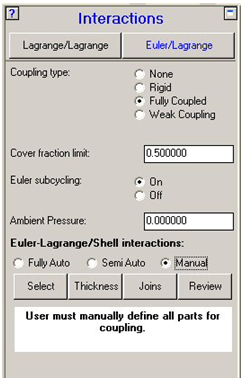
This panel lets you set up interactions (coupling) between 3D Lagrange Parts and Euler Parts.
- Coupling Type
Select the coupling type you want to use.
- None
No coupling is defined.
- Rigid
Fill Parts are used to define rigid boundaries for Euler.
- Fully Coupled
Lagrange Parts interact with Euler Parts dynamically.
- Weak Coupling
A fast method for having Lagrange and Euler Parts interact dynamically.
- Cover fraction limit
The cover fraction limit. This is used to determine when a partially covered Euler cell is blended to a neighbor.
- Euler subcycling
Select whether you want Euler subcycling On or Off
- Euler-Lagrange/Shell interactions
- Fully Auto
All structural parts will automatically be coupled with all Eulerian parts in the model. Shell parts will be thickened automatically to fit the initial Euler region they reside in.
- Review
Displays your Euler-Lagrange/Shell interactions.
- Semi Auto
You must manually select all structural parts that will be coupled with all Eulerian parts in the model. Shell parts will be thickened automatically to fit the initial Euler region they reside in.
- Select
Selects the structural Parts you want to couple to Euler.
- Review
Displays your Euler-Lagrange/Shell interactions.
- Manual
You must manually select all structural parts that will be coupled with all Eulerian parts in the model and also define the artificial thickness of each shell part in the interaction.
- Select
Selects the structural Parts you want to couple to Euler.
- Thickness
Specifies the shell thickness you want to use for the coupling calculation.
- Joins
Specifies which shells are to be joined for the coupling calculation.
- Review
Displays your Euler-Lagrange/Shell interactions.
- Weak coupling settings
Select the weak coupling settings.
- Browse
Enables you to select the location and name of the weak coupling field files to be used.
- Geometry for mapping
Selection of the Lagrange geometry that is used for the remapping. You can select the initial geometry or the current geometry.


